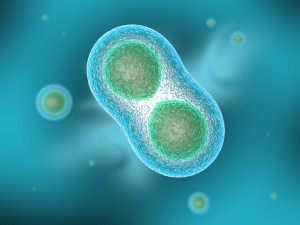Have you seen the new ads promising to cure your ________ (you fill in the blank with whatever disease you have) with stem cell therapy? Did you read the small print? Lately my patients have been increasingly asking me about stem cell therapy for PAH. Patients are bringing in pretty advertisements from companies that are making grand promises. Too good to be true?
Introduction To Stem Cells
 Let’s start with an introduction to stem cells. Very early in our development, shortly after the sperm fertilizes the egg, each cell has the potential to develop into any part of the body. As these early cells divide and keep dividing certain cells take on more and more specialized functions. For example, after a certain point in fetal development cells destined to become your heart are committed to that pathway. Other cells remain less committed. These uncommitted cells are often referred to as stem cells. In reality there are several different types of stem cells that are derived from different sources. In health, most tissues are thought to have a small number of these stem cells that function as a reservoir of renewable cells to maintain a tissue’s health and integrity. This has led to the concept that many diseases might be treated if we could somehow infuse these regenerative cells into the body and have them repopulate the diseased part of the body and regenerate healthy tissue.
Let’s start with an introduction to stem cells. Very early in our development, shortly after the sperm fertilizes the egg, each cell has the potential to develop into any part of the body. As these early cells divide and keep dividing certain cells take on more and more specialized functions. For example, after a certain point in fetal development cells destined to become your heart are committed to that pathway. Other cells remain less committed. These uncommitted cells are often referred to as stem cells. In reality there are several different types of stem cells that are derived from different sources. In health, most tissues are thought to have a small number of these stem cells that function as a reservoir of renewable cells to maintain a tissue’s health and integrity. This has led to the concept that many diseases might be treated if we could somehow infuse these regenerative cells into the body and have them repopulate the diseased part of the body and regenerate healthy tissue.
The greatest success of stem cells is in the treatment of certain blood cancers such as leukemia. Bone marrow or hematopoetic stem cell transplantation (HSCT) can be curative. In HSCT the patient’s immune system is destroyed with chemotherapy and then either their own stem cells that have been previously harvested or a different person’s stem cells are infused. These cells then settle in the bone marrow and repopulate the immune system. Over time, the result is a normal functioning immune system derived from the stem cells.
Scientists have made progress in applying this type of treatment in animal models of several diseases. Recently, patients with a rare type of blindness had some vision restored through a form of stem cell transplantation.
Are Stem Cells A Cure For PAH?
So why are we still struggling to treat, let alone cure diseases, if stem cells are available? Well slow down! First the difference between a concept and  a safe effective treatment is tremendous. Many treatments for many diseases that made such great sense turned out to be not just ineffective but harmful. There is a scientific process that involves careful testing of new treatments to ensure safety and efficacy. This scientific process has not been completed to evaluate stem cells for the treatment of pulmonary arterial hypertension. It would be foolish to dive into a treatment when we have no data in humans.
a safe effective treatment is tremendous. Many treatments for many diseases that made such great sense turned out to be not just ineffective but harmful. There is a scientific process that involves careful testing of new treatments to ensure safety and efficacy. This scientific process has not been completed to evaluate stem cells for the treatment of pulmonary arterial hypertension. It would be foolish to dive into a treatment when we have no data in humans.
Desperate Patients Make Good Targets For Scammers
From the beginning of time, scammers have realized that the more desperate the patient the more they would be willing to pay and the greater the risk they would be willing to take for the promise of a cure or even some benefit. Patients with a progressive disease such as PAH may become “desperate” as their disease progresses and they begin to run out of treatment options. A handful of scammers practicing pseudo-medicine in other countries made grand promises for the bargain price of tens of thousands of dollars. Not only are these treatments of unproven benefit, but they may result in harm. I have seen life threatening infections that were caused by such treatments.
How Can You Protect Yourself?
- Ask if the treatment is FDA approved. The Food and Drug Administration is your best defense against dangerous would be medications or treatments. The process to get approval requires rigorous study and is free of bias. This means that the people that make the decision about a drug’s efficacy don’t benefit financially.
- If the treatment is not proven then don’t take it! For example, nutritional supplements are often claimed to be of dramatic benefit. Read the fine print: “these claims are not verified by the FDA”. If you see that sentence then you should immediately assume that there is no good data supporting the treatment. Remember, there is data and then there is good data. Companies selling you stem cells rely on testimonials. For example, the story of “John” who had terrible PAH and is now cured after buying the stem cell treatment. This is not data and certainly is not proof. Any medical intervention that relies on testimonials is not reliable and should be avoided.
- Does it sound too good to be true? If the answer is yes, then the claims are false. For example, if someone is selling you stem cell treatment to “cure” your PAH you should immediately be asking why the FDA has not approved this for widespread use.
- Never pay to participate in a research study. The FDA prohibits requiring the patient to pay to participate in research. In other words, if you are paying for it, then it is not research.
I have had patients tell me that they understand that stem cells are unproven but they are desperate and are willing to part with a large sum of money on the off chance that it might work. My advice is that you are better served by donating that money to a bona fide research organization that is studying the disease process. At least that way there is no chance of being harmed by a bogus intervention.
Are Stem Cells Being Studied For The Treatment of PAH?
At present, there are no FDA approved uses for stem cells in PAH or other lung diseases. There is some early good quality research being done. We are hopeful that in the next year or two larger scale studies in PAH will begin. Once these real research studies begin, it will be vital that patients participate.
How do I know if the study that I am considering is a “real” research study?
- You will be given a detailed packet of information called an informed consent form.
- You can find the study listed on the government’s website listing all active research studies – Clinicaltrials.gov
- You will never have to pay to participate in a real research study
- You will never be promised to benefit from the study
